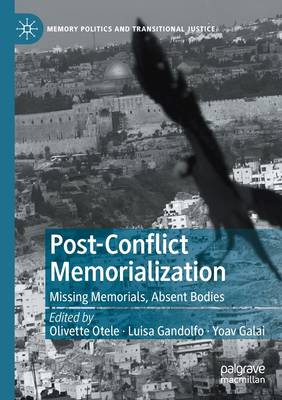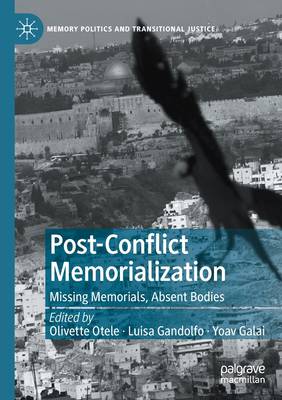
Je cadeautjes zeker op tijd in huis hebben voor de feestdagen? Kom langs in onze winkels en vind het perfecte geschenk!
- Afhalen na 1 uur in een winkel met voorraad
- Gratis thuislevering in België vanaf € 30
- Ruim aanbod met 7 miljoen producten
Je cadeautjes zeker op tijd in huis hebben voor de feestdagen? Kom langs in onze winkels en vind het perfecte geschenk!
- Afhalen na 1 uur in een winkel met voorraad
- Gratis thuislevering in België vanaf € 30
- Ruim aanbod met 7 miljoen producten
Zoeken
Post-Conflict Memorialization
Missing Memorials, Absent Bodies
€ 213,95
+ 427 punten
Omschrijving
As the world negotiates immense loss and questions of how to memorialize, the contributions in this volume evaluate the role of culture as a means to promote reconciliation, either between formerly warring parties, perpetrators and survivors, governments and communities, or within the self. Post-Conflict Memorialization: Missing Memorials, Absent Bodies reflects on a distinct aspect of mourning work: the possibility to move towards recovery, while in a period of grief, waiting, silence, or erasure. Drawing on ethnographic data and archival material from Bosnia-Herzegovina, Argentina, Palestine, Israel, Wales, Peru, Colombia, Hungary, Chile, Pakistan, and India, the authors analyze how memorialization and commemoration is practiced by communities who have experienced trauma and violence, while in the absence of memorials, mutual acknowledgement, and the bodies of the missing. This timely volume will appeal to undergraduate and postgraduate students, postdoctoral researchers, and scholars with an interest in memory studies, sociology, history, politics, conflict, and peace studies
Specificaties
Betrokkenen
- Uitgeverij:
Inhoud
- Aantal bladzijden:
- 261
- Taal:
- Engels
- Reeks:
Eigenschappen
- Productcode (EAN):
- 9783030548896
- Verschijningsdatum:
- 9/03/2022
- Uitvoering:
- Paperback
- Formaat:
- Trade paperback (VS)
- Afmetingen:
- 148 mm x 210 mm
- Gewicht:
- 362 g

Alleen bij Standaard Boekhandel
+ 427 punten op je klantenkaart van Standaard Boekhandel
Beoordelingen
We publiceren alleen reviews die voldoen aan de voorwaarden voor reviews. Bekijk onze voorwaarden voor reviews.








